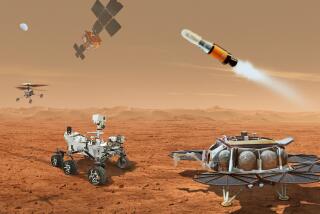Trump’s budget would kill NASA’s WFIRST telescope. Astronomers say that would be a mistake
A NASA space telescope that would probe distant planets and explore some of the biggest mysteries of the cosmos is on the chopping block in President Trump’s 2019 budget proposal released Monday.
The request would zero out funding for NASA’s Wide Field Infrared Survey Telescope, or WFIRST, a repurposed spy satellite donated by the Department of Defense. The move sent shock waves through the scientific community.
“It would be extraordinarily disappointing to see it canceled when a lot of work has gone into it already,” Bruce Macintosh, a Stanford University astrophysicist with the mission, said in an interview.
With a planned launch in the mid-2020s, WFIRST would survey distant galaxies looking for the effects of dark matter, that mysterious stuff that can’t be seen or touched but outnumbers normal matter by roughly 5 to 1. The telescope would study Type Ia supernovas to track dark energy, that strange repulsive force that is causing the universe to expand faster and faster. The observatory could even use its instruments to explore the planets around other stars.
Although the $19.6 billion proposed for NASA would represent a 2.6% bump from the previous year, WFIRST, along with five earth science missions, did not appear to make the cut.
According to documents from the White House’s Office of Management and Budget, WFIRST received $105 million in funding in 2017, and continuing to develop it in future years would have ramped up the total cost to $3 billion.
“Given competing priorities at NASA, and budget constraints, developing another large space telescope immediately after completing the $8.8-billion James Webb Space Telescope is not a priority for the administration,” the documents say. “The budget proposes to terminate WFIRST and redirect existing funds to other priorities of the science community, including completed astrophysics missions and research.”
A recent analysis found that WFIRST would not be able to keep its costs under $3.2 billion, but Macintosh said that the agency had been successfully working to stay under that cap.
He was quick to point out that in 2010, astronomers had selected WFIRST as their highest priority for the decade.
The move attracted widespread scorn from scientists on Twitter, including David Spergel, a Princeton University theoretical astrophysicist and co-chair of WFIRST’s science team.
John Logsdon, a space policy expert at George Washington University, took a different view.
He said the move to cut WFIRST was a “conscious and purposely taken decision,” part of a strategy to reorient the agency toward sending humans back to the moon.
“It depends on what one’s priorities are,” Logsdon said. “I’m an advocate of exploration, and the proposal for taking the initial steps and getting back to the moon and eventually going beyond to me have higher priority than the understanding of the universe that WFIRST is intended to give. But that’s a hard call. It’s balancing one good thing against another good thing.”
Ultimately, Macintosh pointed out, the White House budget proposal is just one step in the process — one that, at the end of the day, could be accepted or ignored by Congress.
In the meantime, some scientists, including Spergel, urged their followers to voice their opposition to the White House budget proposal and urge Congress to protect the mission.
Other aspects of the NASA budget proposal also received scrutiny from Rep. Adam Schiff (D-Burbank), including the cuts to several earth science missions and a plan to end federal funding to the International Space Station, potentially shifting control over to commercial outfits.
“While I am pleased to see increased investment in NASA’s overall mission and continued support for planetary science, I have concerns over the proposed cuts to Earth Science as well as the President’s plan to ending federal funding for the International Space Station in 2025,” Schiff said in a statement. “I will work with my colleagues in Congress to make sure Earth Science receives robust funding and that we continue our partnership with ISS well beyond 2025.”
Follow @aminawrite on Twitter for more science news and “like” Los Angeles Times Science & Health on Facebook.
MORE IN SCIENCE
Scientists take an atomic clock on the road and use it to measure the height of a mountain
In soil-dwelling bacteria, scientists find a new weapon to fight drug-resistant superbugs
Drivers beware: Risk of fatal car crashes spikes on the 4/20 marijuana ‘holiday,’ study says







